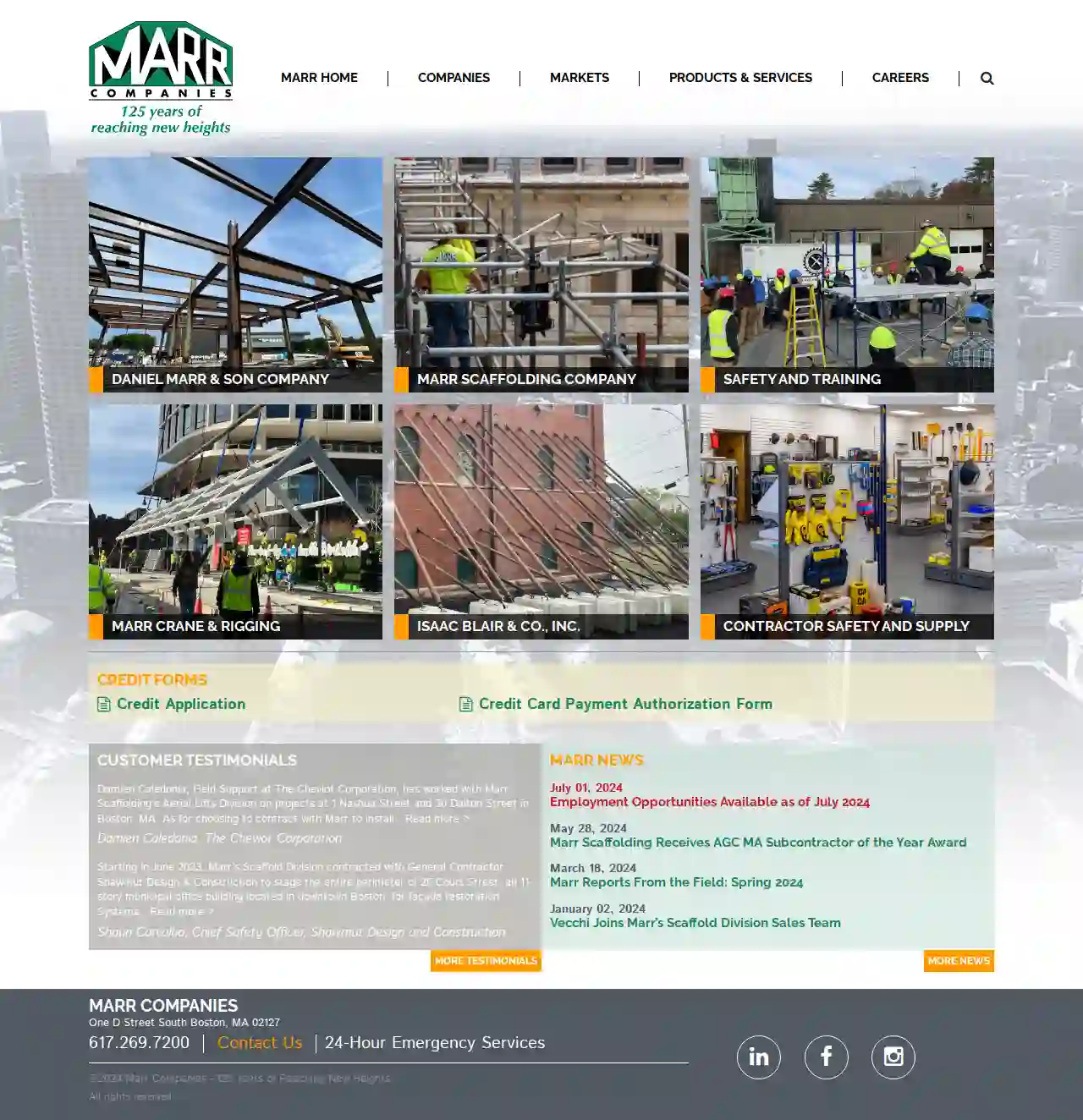Scaffolding Companies Portsmouth
Find the best Scaffolding Specialists in Portsmouth
Receive up to 3 Construction Scaffolding quotes for your project today! Compare profiles, reviews, accreditations, portfolio, etc... and choose the best service.

Marr Scaffolding Company - Providence
44 reviewsOne D Street South Boston, MA, Boston, 02127, USMarr Companies: A Legacy of Excellence For over 125 years, Marr Companies has been a trusted leader in the construction industry, providing a wide range of services and products to meet the needs of our clients. Our commitment to safety, quality, and customer satisfaction has earned us a reputation for excellence throughout the region. Our Mission Our mission is to provide our clients with the highest quality construction services and products, delivered safely and efficiently. We strive to build lasting relationships with our clients, based on trust, respect, and a shared commitment to excellence. Our Values Our values guide everything we do. We are committed to: Safety First Quality Workmanship Customer Satisfaction Integrity and Ethics Teamwork and Collaboration Our Experience Our team of experienced professionals has a deep understanding of the construction industry and a proven track record of success. We are committed to providing our clients with the best possible service and support, from the initial planning stages to the final completion of the project.
- Services
- Why Us?
- Gallery
Get Quote
Atlas Scaffolding & Equipment
51 reviewsWarwick, RI, 80 Gilbane Street, 02886, USAtlas Scaffolding & Equipment is a full-service scaffolding, shoring, and trash chute equipment rentals, sales, installation, and dismantling services company. Established in 1997, they cater to contractors, municipalities, and industrial customers throughout Rhode Island, Southeastern Massachusetts, and parts of Connecticut. Their main facility is located at 80 Gilbane Street, Warwick, RI. Known for their excellent safety record, quick and responsive service, free estimates, full insurance, strict OSHA compliance, and membership in the SIA, Atlas Scaffolding is a trusted name in the industry.
- Services
- Why Us?
- Accreditations
- Our Team
- Testimonials
- Gallery
Get Quote- Ne
Newport Builders' Supply Co
Providence, US- Services
- Why Us?
Get Quote
Over 2,353+ Scaffolding Companies in our network
Our scaffolding contractors operate in Portsmouth & surroundings!
ScaffoldingHQ has curated and vetted Top Scaffolding Contractors in Portsmouth. Find the most trustworthy business today.
Frequently Asked Questions About Scaffolding Companies
- Work at Height Regulations 2005: Covers all work at height and outlines the need for risk assessments, competent erectors, and safe equipment.
- Construction (Design and Management) Regulations 2015 (CDM): Applies to construction projects and requires planning for scaffolding safety throughout the project lifecycle.
- British Standard BS EN 12811: Sets standards for the design, manufacture, and testing of scaffolding components.
- NASC (National Access & Scaffolding Confederation) Guidance: Provides industry best practices and safety recommendations for scaffolding.
- Project Height and Access: The height of the structure and the accessibility of the working area are primary considerations.
- Load Capacity: The weight of workers, materials, and equipment that the scaffolding needs to support.
- Project Complexity and Shape: The shape and complexity of the structure may necessitate specialized scaffolding configurations.
- Ground Conditions: The type of ground (soft, uneven, sloping) will influence the scaffolding foundation and support requirements.
- Duration of Use: The length of time the scaffolding will be needed can impact the choice of system.
- Budget: Different scaffolding types have varying costs.
- Regulations: Local regulations often specify minimum inspection intervals.
- Project Type and Duration: Long-term projects or those in challenging environments may require more frequent inspections.
- Weather Conditions: Severe weather (storms, high winds) can necessitate additional inspections.
- Any Alterations or Modifications: Any changes to the scaffolding structure require re-inspection.
What are the safety regulations for scaffolding in the USA?
How do I choose the right type of scaffolding for my project?
What is a scaffolding hoist?
How often should scaffolding be inspected?
What are the safety regulations for scaffolding in the USA?
- Work at Height Regulations 2005: Covers all work at height and outlines the need for risk assessments, competent erectors, and safe equipment.
- Construction (Design and Management) Regulations 2015 (CDM): Applies to construction projects and requires planning for scaffolding safety throughout the project lifecycle.
- British Standard BS EN 12811: Sets standards for the design, manufacture, and testing of scaffolding components.
- NASC (National Access & Scaffolding Confederation) Guidance: Provides industry best practices and safety recommendations for scaffolding.
How do I choose the right type of scaffolding for my project?
- Project Height and Access: The height of the structure and the accessibility of the working area are primary considerations.
- Load Capacity: The weight of workers, materials, and equipment that the scaffolding needs to support.
- Project Complexity and Shape: The shape and complexity of the structure may necessitate specialized scaffolding configurations.
- Ground Conditions: The type of ground (soft, uneven, sloping) will influence the scaffolding foundation and support requirements.
- Duration of Use: The length of time the scaffolding will be needed can impact the choice of system.
- Budget: Different scaffolding types have varying costs.
What is a scaffolding hoist?
How often should scaffolding be inspected?
- Regulations: Local regulations often specify minimum inspection intervals.
- Project Type and Duration: Long-term projects or those in challenging environments may require more frequent inspections.
- Weather Conditions: Severe weather (storms, high winds) can necessitate additional inspections.
- Any Alterations or Modifications: Any changes to the scaffolding structure require re-inspection.